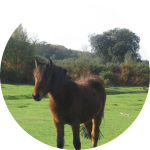|
Dressage is a competitive equestrian sport, the principles
of which date back to Ancient Greek military equine training
systems. Dressage as it is practiced today, however, has its
roots in the Renaissance. Frederico Grisone founded the first
equestrian academy in Naples in 1532, when horsemanship began
to be regarded as an art, where the movements that evolved
into modern day dressage were taught. Within the next two
centuries, French and Spanish academies that are still influential
today were also established and dedicated to the art. Classical
dressage as these institutes developed it remains significant
as the basis for modern dressage.
The development of competitive dressage began in Europe early
in the 20th century, and the sport was incorporated into the
Olympic Games in 1912. Though dressage was initially included
in the Olympics as a mere obedience test, its Olympic standards
had been improved to include most modern moves by 1936. Dressage
remained a predominantly military sport at this time; however,
this changed by 1952, at which time dressage had risen in
popularity, the U.S. cavalry had been disbanded, women were
allowed to compete in the Olympics.
Today, dressage entails the training of horses to perform
complex and spectacular movements. However, it is more accurate
to say that the goal of this training is to extend the natural
movements and characteristics of the horse to their full potential
rather than to force horses to move in impressive but unnatural
ways. Ultimately, a good dressage horse will willingly and
immediately respond to the rider's very few aids; will make
its movements appear effortless and beautiful while being
well-balanced and relaxed; and will perform safely and comfortably
as a riding horse.
Good dressage horses require a level of athleticism; they
must be fit in order to accomplish the more difficult dressage
movements. As a general rule, horses with powerful hindquarters;
ideal pastern and shoulder slopes; and long croups that slope
slightly are best suited to the demands of dressage movements,
although other horses may succeed in dressage. Dressage horses
must also be intelligent and well-schooled. Though all riding
horses may train for dressage, horses from the warmblood category
are a popular choice and are seen the most often at prestigious
dressage competitions.
Horses compete across the world in dressage in amateur competitions
and prestigious competitions such as the Olympics and the
FEI World Equestrian Games, and in all levels in between.
Having been defined by the FEI as "the highest expression
of horse training," dressage is a thrilling sport and a true
art.
|






